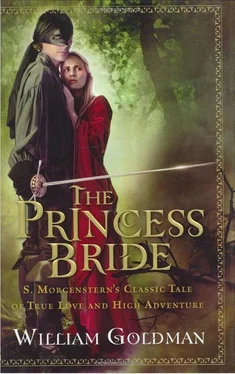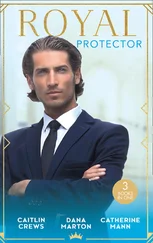Yeste grew very rich.
And very heavy.
Every part of his body sagged. He had the only fat thumbs in Madrid. Dressing took an hour, breakfast the same, everything went slowly.
But he could still make swords. And people still craved them. "I'm sorry," he said to the young Spaniard who entered his shop one particular morning. "The wait is up to four years and even I am embarrassed to mention the price. Have your weapon made by another."
"I have my weapon," the Spaniard said.
And he threw the six-fingered sword across Yeste's workbench.
Such embraces.
"Never leave again," Yeste said. "I eat too much when I'm lonely."
"I cannot stay," Inigo told him. "I'm only here to ask you one question. As you know, I have spent the last ten years learning. Now I have come for you to tell me if I'm ready."
"Ready? For what? What in the world have you been learning?"
"The sword."
"Madness," said Yeste. "You have spent ten entire years just learning to fence?"
"No, not just learning to fence," Inigo answered. "I did many other things as well."
"Tell me."
"Well," Inigo began, "ten years is what? About thirty-six hundred days. And that's about—I figured this out once, so I remember pretty well—about eighty-six thousand hours. Well, I always made it a point to get four hours sleep per night. That's fourteen thousand hours right there, leaving me perhaps seventy-two thousand hours to account for."
"You slept. I'm with you. What else?"
"Well, I squeezed rocks."
"I'm sorry, my hearing sometimes fails me; it sounded like you said you squeezed rocks."
"To make my wrists strong. So I could control the sword. Rocks like apples. That size. I would squeeze them in each hand for perhaps two hours a day. And I would spend another two hours a day in skipping and dodging and moving quickly, so that my feet would be able to get me into position to deliver properly the thrust of the sword. That's another fourteen thousand hours. I'm down to fifty-eight thousand now. Well, I always sprinted two hours each day as fast as I could, so my legs, as well as being quick, would also be strong. And that gets me down to about fifty thousand hours."
Yeste examined the young man before him. Blade thin, six feet in height, straight as a sapling, bright eyed, taut; even motionless he seemed whippet quick. "And these last fifty thousand hours? These have been spent studying the sword?"
Inigo nodded.
"Where?"
"Wherever I could find a master. Venice, Bruges, Budapest."
"I could have taught you here?"
"True. But you care for me. You would not have been ruthless. You would have said, 'Excellent parry, Inigo, now that's enough for one day; let's have supper.'"
"That does sound like me," Yeste admitted. "But why was it so important? Why was it worth so much of your life?"
"Because I could not fail him again."
"Fail who?"
"My father. I have spent all these years preparing to find the six-fingered man and kill him in a duel. But he is a master, Yeste. He said as much and I saw the way his sword flew at Domingo. I must not lose that duel when I find him, so now I have come to you. You know swords and swordsmen. You must not lie. Am I ready? If you say I am, I will seek him through the world. If you say no, I will spend another ten years and another ten after that, if that is needed."
So they went to Yeste's courtyard. It was late morning. Hot. Yeste put his body in a chair and the chair in the shade. Inigo stood waiting in the sunshine. "We need not test desire and we know you have sufficient motive to deliver the death blow," Yeste said. "Therefore we need only probe your knowledge and speed and stamina. We need no enemy for this. The enemy is always in the mind. Visualize him."
Inigo drew his sword.
"The six-fingered man taunts you," Yeste called. "Do what you can."
Inigo began to leap around the courtyard, the great blade flashing.
"He uses the Agrippa defense," Yeste shouted.
Immediately, Inigo shifted position, increased the speed of his sword.
"Now he surprises you with Bonetti's attack."
But Inigo was not surprised for long. Again his feet shifted; he moved his body a different way. Perspiration was pouring down his thin frame now and the great blade was blinding. Yeste continued to shout. Inigo continued to shift. The blade never stopped.
At three in the afternoon, Yeste said, "Enough. I am exhausted from the watching."
Inigo sheathed the six-fingered sword and waited.
"You wish to know if I feel you are ready to duel to the death a man ruthless enough to kill your father, rich enough to buy protection, older and more experienced, an acknowledged master."
Inigo nodded.
"I'll tell you the truth, and it's up to you to live with it. First, there has never been a master as young as you. Thirty years at least before that rank has yet been reached, and you are barely twenty-two. Well, the truth is you are an impetuous boy driven by madness and you are not now and you will never be a master."
"Thank you for your honesty," Inigo said. "I must tell you I had hoped for better news. I find it very hard to speak just now, so if you'll please excuse me, I'll be on my—"
"I had not finished," Yeste said.
"What else is there to say?"
"I loved your father very dearly, that you know, but this you did not know: when we were very young, not yet twenty, we saw, with our own eyes, an exhibition by the Corsican Wizard, Bastia."
"I know of no wizards."
"It is the rank beyond master in swordsmanship," Yeste said. "Bastia was the last man so designated. Long before your birth, he died at sea. There have been no wizards since, and you would never in this world have beaten him. But I tell you this: he would never in this world have beaten you."
Inigo stood silent for a long time. "I am ready then."
"I would not enjoy being the six-fingered man" was all Yeste replied.
The next morning, Inigo began the track-down. He had it all carefully prepared in his mind. He would find the six-fingered man. He would go up to him. He would say simply, "Hello, my name is Inigo Montoya, you killed my father, prepare to die," and then, oh then, the duel.
It was a lovely plan really. Simple, direct. No frills. In the beginning, Inigo had all kinds of wild vengeance notions, but gradually, simplicity had seemed the better way. Originally, he had all kinds of little plays worked out in his mind—the enemy would weep and beg, the enemy would cringe and cry, the enemy would bribe and slobber and act in every way unmanly. But eventually, these too gave way in his mind to simplicity: the enemy would simply say, "Oh, yes, I remember killing him; I'll be only too delighted to kill you too."
Inigo had only one problem: he could not find the enemy.
It never occurred to him there would be the least difficulty. After all, how many noblemen were there with six fingers on their right hands? Surely, it would be the talk of whatever his vicinity happened to be. A few questions: "Pardon, I'm not crazy, but have you seen any six-fingered noblemen lately?" and surely sooner or later, there would be an answering "yes."
But it didn't come sooner.
And later wasn't the kind of thing you wanted to hold your breath for either.
The first month wasn't all that discouraging. Inigo crisscrossed Spain and Portugal. The second month he moved to France and spent the rest of the year there. The year following that was his Italian year, and then came Germany and the whole of Switzerland.
It was only after five solid years of failure that he began to worry. By then he had seen all of the Balkans and most of Scandinavia and had visited the Florinese and the natives of Guilder and into Mother Russia and down step by step around the entire Mediterranean.
Читать дальше












